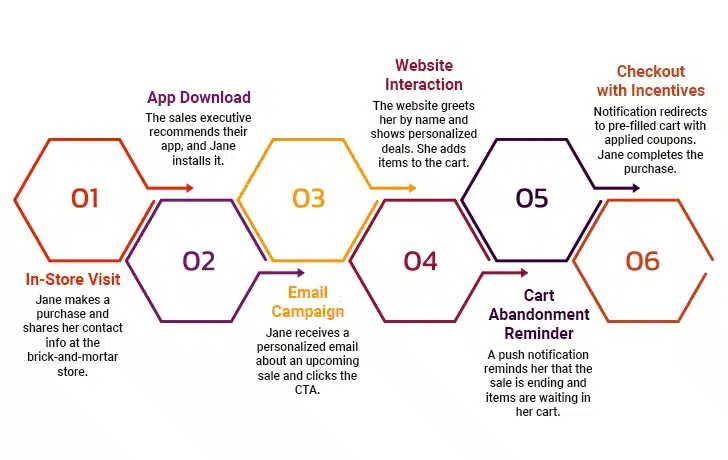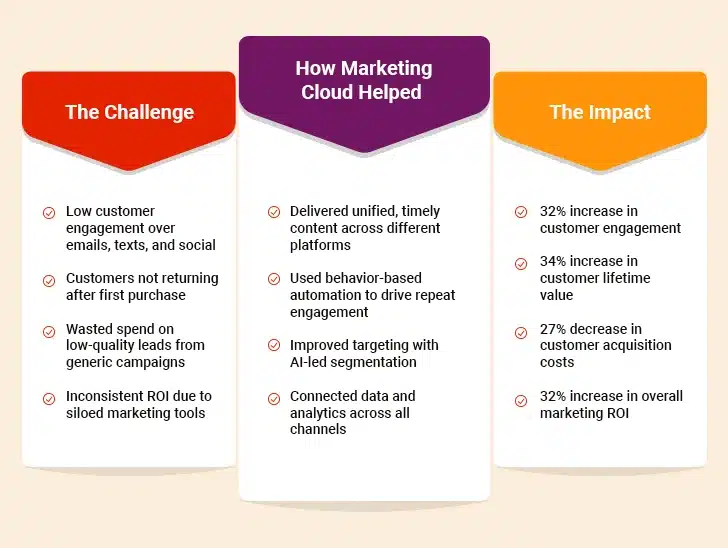“AI, Data, and CRM are how we achieve the promise of speaking directly to consumers with the thing that matters most to them.” – Doug Martin, Chief Brand and Disruptive Growth Officer at General Mills.
How many times have you stood in line at the checkout counter only to browse for your cart items online? In all probability, that is all of us at some point.
Digital technologies have provided a new platform for modern-day consumers, spoiling them for choice. They have multiple options for buying goods and services from various sources. However, an omnichannel presence could result in silos that dilute the overall customer experience and make marketing more challenging.
So, how can businesses integrate and unify this fragmented framework?
The answer is simple: Salesforce Marketing Cloud (SFMC). As a powerful, AI-native platform, SFMC enables businesses to create cohesive omnichannel journeys by connecting every touchpoint. Whether you’re a small business or a global enterprise, it gives you the clarity, control, and creativity needed to thrive in an omnichannel marketing world.
In this blog post, we’ll explore why Salesforce Marketing Cloud is the ideal solution for modern businesses and how partnering with Salesforce Marketing Cloud implementation experts can help streamline your omnichannel marketing efforts.
Table of Contents
- What Is Omnichannel Marketing?
- How Does Omnichannel Marketing Benefit Businesses?
- Why Is Omnichannel Marketing Harder Than It Looks?
- What Is Salesforce Marketing Cloud?
- What Does Omnichannel Marketing Look Like with Salesforce Marketing Cloud?
- How Does Salesforce Marketing Cloud Improve Omnichannel Marketing?
- Personalization That Goes Beyond the Surface
- Role Played by Salesforce Marketing Cloud Implementation Partners
- Conclusion
What Is Omnichannel Marketing?
According to a study, a customer typically experiences approximately 6 touchpoints before developing confidence in the brand and proceeding with a purchase. However, what if these touchpoints all steered them in different directions or distracted them from the business’s primary objective? Naturally, it would ultimately cause the deal to fallout!
Consistency is the key to successfully grooming your prospects and converting them into paying customers, and omnichannel marketing is here to sustain it.
Omnichannel marketing is a multi-channel sales approach that deploys multiple marketing campaigns across various media and integrates them all for a unified customer experience. As such, your customers enjoy an immersive, personalized, and consistent experience, regardless of their type, preferred platform, or stage of the customer’s journey!
To truly grasp the power of omnichannel marketing, let’s compare it with traditional approaches:
| Criteria | Traditional Marketing | Omnichannel Marketing |
|---|---|---|
| Channel Strategy | Channel-specific, isolated campaigns | Unified messaging across all touchpoints |
| Customer Data | Fragmented and siloed | Centralized, 360° customer profile |
| Priority | Product/service promotion | Unified brand experience |
| Communication | Brand to customer | Multi-directional and interactive |
Ready to unify your marketing and boost ROI? Partner with Salesforce-certified experts today.
How Does Omnichannel Marketing Benefit Businesses?
Modern customers use multiple channels during their shopping experience. As such, omnichannel marketing emerges as the ideal solution to tap into these market pools, improve customer retention rates, and enhance customer satisfaction simultaneously. Here’s a summary of the notable benefits of omnichannel marketing:
- It orchestrates a delightful customer experience, simplifying the buying process, making the customer journey seamless and memorable, and fostering loyalty.
- It puts the customer and their data in the spotlight, which helps build your brand customer centric.
- It enhances data quality by allowing you to curate customer data from disparate data sources and ecosystems.
- The granular customer data analysis provided by this strategy offers valuable insights into customer behavior, enabling better segmentation and targeted marketing.
- It weaves together the multi-channel marketing campaigns and creates synergy amongst the teams operating them.
- It offers greater brand visibility by establishing your online and offline presence through email, mobile devices, and physical stores.
- Its data-driven and personalized approach makes it cost-effective with an appreciable ROI.
Salesforce Marketing Cloud implementation makes all of the above easier to achieve.
Why Is Omnichannel Marketing Harder Than It Looks?
Customers are everywhere: emails, social feeds, mobile apps, websites. And they expect brands to meet them wherever they are, with relevance, speed, and consistency. However, juggling multiple tools often results in disconnected campaigns and lost opportunities. Such fragmentation is the enemy of great marketing as disconnected tools mean disconnected insights. You can’t create meaningful experiences when your data is scattered across platforms. Marketing Cloud solves this problem at the root.
What Is Salesforce Marketing Cloud?
Salesforce Marketing Cloud (SFMC) is a full-stack marketing platform designed to help businesses personalize customer interactions at every stage of the lifecycle. It brings together email, mobile, social media, advertising, web, and analytics in one unified ecosystem.
And thanks to Salesforce Marketing Cloud features, including Agentforce, Salesforce’s agentic AI platform, SFMC is more than automation. It’s a predictive, contextual, and intelligent tool.
What Does Omnichannel Marketing Look Like with Salesforce Marketing Cloud?
Let’s understand omnichannel marketing through an illustration:
Consider a makeup brand that has a strong presence both online and offline.
Jane Doe visits the brick-and-mortar store to make a purchase. Upon purchasing the products, Jane shares her details, including her name, mobile number, and email address. She also downloads their mobile app upon the recommendation of the sales executive.
After a while, Jane receives an email informing her of an upcoming sale by the makeup brand. As she navigates to the website by clicking on the CTA, she receives a personalized welcome message and a few deals tailored to her needs. She adds a few items to her cart but later drops the idea of buying them.
After a couple of days, she receives a mobile app push notification informing her that the sale is about to end and she still has items in her cart. When she taps on the notification, she is redirected to the cart, where her personalized coupons have already been applied to the items she added. All she has to do now is make the payment!
This is Salesforce Marketing Cloud engagement in action.
How Does Salesforce Marketing Cloud Improve Omnichannel Marketing?
Salesforce Marketing Cloud features and tools such as Journey Builder, Einstein AI, and Agentforce help deliver connected, intelligent experiences across channels while pulling customer data into a single, unified profile. Whether it’s a push notification, email, or web message, a successful Salesforce Marketing Cloud implementation ensures every interaction is consistent, timely, and tailored. Here’s how it improves omnichannel marketing for businesses of all types and sizes:
Strategic Marketing with Journey Builder
“Your marketing organization now has the ability to connect seamlessly into commerce, into service, into sales, across a full customer journey” – Steve Hammond, General Manager of Salesforce Marketing Cloud.
To deliver consistent, impactful experiences, you need more than good messaging; you need a strategy. Journey Builder in Marketing Cloud lets you visually plan and automate customer journeys across all channels.
With its drag-and-drop interface, marketers can trigger emails, SMS messages, push notifications, and dynamic content based on customer behaviors and preferences. For example, send a welcome email when a user signs up, follow it up with a discount SMS after two days, and push personalized content to re-engage them later.
AI-Powered Intelligence with Agentforce at the Core
What sets Salesforce apart is not just automation, it’s intelligence. Agentforce is the AI-native platform behind SFMC, helping you transition from guesswork to decision-making grounded in data.
Here’s what Agentforce brings to the table:
- Content creation tailored to user profiles
- Predictive recommendations for send times and channels
- Customer sentiment and intent detection
- Next-best-action suggestions
This means your campaigns become proactive, not reactive. You’re engaging users with what they want, before they ask for it.
Smart Decision-Making with Einstein AI
Einstein AI is a powerful interactive tool that merges public and private AI models with CRM data. It combines the capabilities of automation, machine learning, and predictive analytics. To level up even further, Einstein AI integrates with SFMC and amplifies what’s possible:
- Predict open and click-through rates for email campaigns
- Suggest products and content that each user is likely to engage with
- Identify high-churn risk customers and target them for retention
- Adjust send times to suit each user’s schedule
All in all, Einstein AO works as a predictive marketing analyst that never sleeps.
Personalization That Goes Beyond the Surface
Salesforce Marketing Cloud personalization goes beyond using a first name. It’s about responding to who your customer is right now. Salesforce CRM and Marketing Cloud integration enables real-time personalization by building a 360-degree customer profile.
It pulls in live data from:
- CRM systems
- Sales and service interactions
- Website behaviors
- Mobile app usage
- Third-party sources
Unparalleled Scalability and Flexibility
Not every business starts with a massive marketing team or tech stack. And that’s okay.
SFMC is modular, which means you can start small, for example, with email, and grow into mobile, web, social, and AI capabilities over time. You get the sophistication of an enterprise system without the burden of complex setup or bloated features.
Building Trust in a Privacy-First World
Privacy laws are tightening across all industries. Also, as customers demand more control over their data usage, ensuring data security is the new currency for building trust.
SFMC includes built-in tools to help you stay compliant with regulations like GDPR and CCPA:
- Consent management workflows
- Data encryption and secure storage
- Detailed audit trails
Intelligent Reporting
You can’t improve what you don’t measure. Marketing Cloud Intelligence boasts a robust analytics suite. It connects all your data, email, mobile, social, ads, and web in one place. It lets you:
- Monitor real-time performance
- Create cross-channel dashboards
- Build custom KPIs
As a result, you can improve efficiency, optimize campaigns, and enhance cross-channel engagement.
Turning Loyalty Into a Growth Engine
Loyalty isn’t just about points; it’s about personalized value. With built-in loyalty tools, Salesforce Marketing Cloud helps you customize loyalty programs. The Loyalty Management Program allows you to:
- Design tiered rewards programs
- Deliver unique perks based on behavior
- Trigger re-engagement journeys automatically
Transform fragmented campaigns into seamless customer journeys with Salesforce Marketing Cloud.
Seamless Connectivity with End-to-End Integration
Effective omnichannel marketing requires teams to communicate effectively and seamlessly with one another. Marketing campaigns no longer rely solely on marketing teams. As such, centralizing the customer database enables various departments, such as sales, customer support, and merchandising, to access and understand customer information intimately.
Resultantly, your teams can put a united front to achieve broader goals. Marketing Cloud plays well with others. You can integrate it with:
- Salesforce CRM
- Commerce Cloud and Service Cloud
- Google, Shopify, Adobe, and more
True Collaboration by Breaking Down Silos
Great customer experiences happen when teams work together. Strategic Salesforce Marketing Cloud implementation ensures that marketing isn’t isolated. Salesforce CRM and marketing cloud integration help form the base for unified, updated customer profiles. It breaks silos and enables true cross-team collaboration. As it connects seamlessly with sales, support, and commerce functions, every team shares one version of the truth.
Ongoing Support for Growth
No matter your team size or experience level, help is always within reach. Whether you’re just beginning your Salesforce Marketing Cloud implementation or scaling an advanced setup, Salesforce offers a wealth of resources to guide your journey:
- Trailhead: Free, gamified learning modules to skill up at your own pace
- Partner and Consultant Ecosystem: Connect with experts for tailored guidance
- 24/7 Technical Support: Get help whenever you need it
- Global Community: Join a vibrant network of users, developers, and strategists
Role Played by Salesforce Marketing Cloud Implementation Partners
Despite having a multitude of capabilities and advantages, Salesforce Marketing Cloud can be difficult to implement and optimize. Here is where partners for the deployment of Salesforce Marketing Cloud prove to be useful. These professionals know the top strategies of implementation and have a specialization in modifying Salesforce Marketing Cloud to suit your unique business requirements.
Here’s how partnering with implementation experts is beneficial:
Experience
Salesforce Marketing Cloud implementation partners have extensive experience working with the platform. They understand its capabilities, limitations, and best practices. Thus, they ensurea smooth and efficient implementation process.Customization
Since every business is unique, off-the-shelf solutions may not be able to entirely meet your requirements. Implementation partners can personalize Salesforce Marketing Cloud to align with your brand, industry, and specific marketing goals.Integration
Effective multi-channel marketing calls for seamless integration with other systems and data sources. Implementation partners have the expertise to integrate Salesforce Marketing Cloud with your CRM, ecommerce platform, and other essential tools.Training and Support
Implementing a new platform generally requires training for your team. Implementation partners offer training and ongoing support to maximize user adoption.Optimization
It’s crucial to continue to improve your marketing techniques after deployment. Salesforce Marketing Cloud implementation partners assist you in data analysis, campaign optimization, and market dynamics adaptation.
Conclusion
Gaining the actual benefits offered by an omnichannel experience is only possible when you add the right tools to the mix. Tools like Salesforce Marketing Cloud eliminate the pain of tedious tasks, such as segmenting and appealing to the audience, allowing you to reap the benefits directly. And all the while, you will be enhancing the customer journey to make it more memorable as well.
Salesforce Marketing Cloud consulting services bring order to chaos, bridge silos, and deliver marketing that feels less like noise and more like a conversation.
Whether you’re looking to streamline workflows, increase ROI, or connect better with your customers, Salesforce Marketing Cloud implementation is the way forward. Just make sure to select the right implementation partners who can guide you to success. With the right tools and expertise, you can streamline your omnichannel marketing efforts.
FAQs
1. How does Salesforce Marketing Cloud unify customer data across channels?
Salesforce Marketing Cloud pulls data from multiple touchpoints like email, mobile, social, web, CRM, and even third-party platforms into one unified customer profile. It uses real-time syncing to keep everything updated and relevant. This eliminates data silos and fragmented insights.
2. Why is it important to partner with Salesforce Marketing Cloud implementation experts?
Implementation experts help you avoid costly missteps and make the most of the platform from the start. They understand how to connect the right features to your goals and avoid performance hiccups. Their experience can speed up your results. Without that guidance, you might spend more time fixing things than growing.
3. How does SFMC help improve marketing measurement and analytics?
With Marketing Cloud Intelligence, you can track performance across all channels in one place. It also allows you to create dashboards, set KPIs, and monitor results in real time. It gives you the full picture without spreadsheet gymnastics. Think of it as a control center for your marketing brain.








